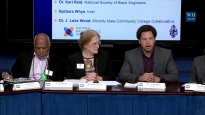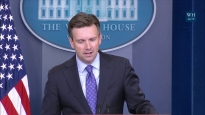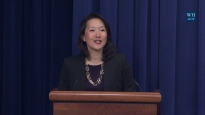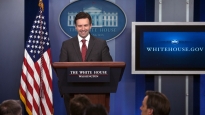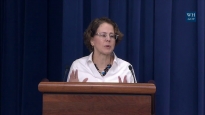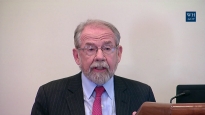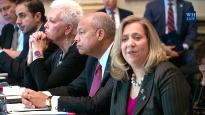Press Briefing 1/8/10
January 08, 2010 | 47:51 | Public Domain
White House Press Briefings are conducted most weekdays from the James S. Brady Press Briefing Room in the West Wing.
Briefing by White House Press Secretary Robert Gibbs, 1/8/2010
12:39 P.M. EST
MR. GIBBS: Good afternoon. You know what -- I forgot the week ahead, so we will email that around at the conclusion of today’s activities.
Yes, ma’am.
Q Thank you. We reported last night that Robert Gates has told the President that he’ll stay on for at least another year. Will you give us some of the back story on that? When and where did they have this talk?
MR. GIBBS: I’d have to look up the exact date, but several weeks ago the President and the Secretary of Defense had a conversation about this. Obviously the President is deeply grateful for the continued service that Secretary Gates provides the Pentagon, our men and women in uniform, and the entire country, and was glad that he is staying on the helm at the Pentagon.
Q I’m sorry, but was there any sense that the Secretary might have been thinking about leaving?
MR. GIBBS: Not anymore.
Yes, sir.
Q So Robert you are confirming he’s staying on for at least another year, is that right?
MR. GIBBS: I think they have confirmed he’s staying on, so I won’t -- I will also confirm, yes.
Q Two questions for you on the economy. The announcement this afternoon has to do again with money from the Recovery Act. Does the President see a need for new money to boost the economy this year?
MR. GIBBS: Right. Today’s announcement is the award recipients for tax incentives for the creation of renewable manufacturing jobs. It’s a, I think, a $2.3 billion program in the Recovery Act. But it’s also an example of something the President believes we should do more of. The number of applicants for the money we have was roughly three to one. In the speech to -- in the speech on jobs at the Brookings Institution in December, the President actually called for increasing this type of investment in the private sector to create that environment for additional hiring by an additional $5 billion.
So the President believes that there are things that have worked and are working well -- targeted money that should be increased, absolutely.
Q But throwing it forward, again, past the Recovery Act that was passed last year, is there any this year for additional spending to boost the economy?
MR. GIBBS: Again, Jeff, I don’t know if we throw it forward or remind you backwards, but, again, in December the President outlined some very specific examples of exactly what he’d like to see -- today’s program being one of those examples; investment in small businesses for additional hiring; infrastructure spending; things like that. So I think the President has been quite clear on that.
Look, we have -- today’s jobs report is obviously disappointing: 85,000 people last month lost their jobs. We are in a very tough economic environment. Since this recession officially began more than two years ago, 7 million jobs have been lost. I honestly doubt, Jeff, that had a report showed 40,000 -- or 20,000 or so jobs created, I can’t imagine that the President would say, well, what I thought we should do in December is now wiped away because of the jobs report. We’ve got a long way to go, and as we talked about this last month, and I think if you look back as we’ve talked about it each month, we knew this was going to be a long road. And we knew that along that road there would be ups and downs and bumps along the way.
I think if you look through and analyze some of the numbers, there are some bright spots which I think are at least encouraging, understanding that there are, as I said, millions of people that have lost their jobs and are hurting. If you take the average of what we were losing in the first quarter of 2009 -- January, February, March -- we were losing on average in those months 691,000 jobs a month.
If you take the average of what we’re losing the last three months of the year -- October, November and December -- that number is 69,000, one-tenth of that job loss. So that trend obviously is moving in the right direction.
But, again, if that number was above the ledger on the positive side, I doubt you’d find anybody in this administration, because I doubt you’d find anybody in this country that believed our economic problems have vanished.
Q Speaking of trends, is the President worried about gasoline getting close to $3 a gallon and how that will affect the economy?
MR. GIBBS: Well, obviously, anything that is perceived or believed that will do damage to our economy or choke off some positive trends in economic recovery would be concerning to the President.
Jake.
Q Economists like Joseph Stiglitz and Paul Krugman say that they’re worried there’s going to be -- the economy is going to contract in the second half. How worried is President Obama about his double-dip recession?
MR. GIBBS: Well, I mean, again, I think I would say the President is worried about today and worried about the future.
Q But does he think it’s likely? I mean, is he --
MR. GIBBS: I would simply say the President is -- wakes up concerned every day about where this economy is, understands that millions are hurting whether they are in last month’s job losses or the job losses stretching past those two years since this recession officially began.
But understand, Jake, people were hurting long before a board said there was a recession in this country.
Q Right. But obviously you plan differently if you expect a -- you know, another contraction of the economy coming up, as opposed to the line that we’re on right now.
MR. GIBBS: But I also think that the President -- again, I’d refer you back to what the President talked about in December, in not being satisfied with where we were and wanting to change the direction of that line.
Q So he is preparing as if there is going to be a contraction, he is --
MR. GIBBS: No, no, no, no. He’s not an economic prognosticator. The President is concerned about the economy, concerned about the stories of people hurting that he has heard for many, many years, and is working to do all that we can to create an environment for businesses, small and large, to hire more people.
Q The administration this week announced that it was going to temporarily, at least -- or for the time being -- suspend the transfer of detainees from Guantanamo Bay to Yemen. You did transfer six in December. Are you -- do you know where those six are?
MR. GIBBS: I’m not going to get into -- I think Christi asked these questions the other day, and I’m not going to get into discussing transfers.
Q Well -- okay. Given the need to talk to Congress and get them onboard with the transfer of prisoners to the Thomson correctional center, you need to convert that prison from a maximum-security prison to a supermax. Do you have any realistic time table as to when you think Guantanamo can actually be closed?
MR. GIBBS: I think Christi also asked that question. I didn’t have a time table answer. Obviously we’ll work with Congress in the upcoming session on many of the things that you talked about -- not just retrofitting, but purchasing a prison in Thomson, as well as other issues relating to the movement of prisoners from Guantanamo to Thomson.
Q Okay, and one last question, I’m sorry. In recent days, Qais Khazaali, who was a member of -- the leader of the League of the Righteous in Iraq -- he was arrested by U.S. forces in 2007; he was responsible for an attack in Karbala that killed five U.S. soldiers. In recent days the U.S. military has turned him over to the Iraqis and the Iraqis have freed him as part of the reconciliation going on there.
MR. GIBBS: Jake, let me ask somebody to --
Q All this is from the Pentagon.
MR. GIBBS: Okay. Well, let me ask -- let me get some information on that case. I don’t have anything in front of me.
Q Well, just a general question, is it appropriate for the U.S. military to turn --
MR. GIBBS: Jake, let me -- other than what you’ve told me, I’m not overly familiar with the details of the case.
Q But as a general principle, should --
MR. GIBBS: I don’t want to generalize about something with which you’ve just asked me with great specificity.
Q Robert, I wanted to ask you about Secretary Geithner. Republicans on the Hill are saying they’ve found some evidence suggesting that under his leadership the New York Fed pressured AIG to conceal information about billions of dollars of the counterparty payments that were made with taxpayer money, and they’re suggesting that he was hiding information from regulators. I wonder, does the White House believe that Secretary Geithner should testify on the Hill, turn over any documents he has, to sort of clear this up?
MR. GIBBS: Ed, I’d point you to the Treasury Department. I’m sure you’ve already talked to them. Secretary Geithner was not involved in any of these emails. These decisions did not rise to his level at the Fed. These are emails and decisions made by officials at an independent regulatory agency --
Q But how do you know that he wasn’t involved? He was the leader of the New York Fed.
MR. GIBBS: Right, but he wasn’t on the emails that have been talked about and wasn’t party to the decision that was being made.
Q Well, Republican Congressman Issa says there are probably thousands of more emails and he may not be on some that some people have looked at. In the interest of transparency would the White House want more -- I mean, you run AIG now, essentially --
MR. GIBBS: I would point you to the Department of Treasury, which I think will tell you that --
Q But what does the White House believe?
MR. GIBBS: I just gave you what the White House believes.
Q Well, no, you gave me the Treasury Department -- no, what do you believe? Do you believe that more emails should come out so we can learn --
MR. GIBBS: What I said was I’m -- I don’t know what the story is about the emails. I would tell you that there are not emails that involve Secretary Geithner in this instance. This is emails and decisions that are being made by two people. That decision did not rise to his level.
Q Okay, last thing on this. Various liberals have jumped on this and other stories about Secretary Geithner, to say that he really is not fit to serve as Treasury Secretary. He still has the President’s full confidence?
MR. GIBBS: Of course.
Q Robert, at today’s 2:40 p.m. event will he be dealing only with the jobs issue and the clean jobs issue, or might he also talk about the Christmas Day incident?
MR. GIBBS: As far as I know the last time I saw the remarks it was just on jobs and the energy announcement.
Q He has spoken quite a bit on the Christmas Day incident but he hasn’t opened himself up to questions from the media. Do you think he might entertain some questions on that --
MR. GIBBS: No.
Q -- and isn’t it unusual that on an event this big that he would not open himself up to questions?
MR. GIBBS: I don’t want to speculate. He’s not taking questions today.
Q Well, Mr. Knoller, I think, will back me up on this. He hasn’t had a press conference since July at the White House. Why can’t we get him to respond to questions rather than just give statements on issues like this?
MR. GIBBS: We did this before. I think the last time we did -- we talked about the President’s media schedule, and here you all, to a person, reminded me of our dramatic overexposure.
Q No, I certainly don’t feel that way.
MR. GIBBS: You don’t now.
Q Well, that was then. (Laughter.)
MR. GIBBS: I appreciate at least that we’ve isolated the flip-flop, and now we can just --
Q Are there any plans for a press conference?
MR. GIBBS: Not that I’m aware of.
Q Let me ask one substantive question. (Laughter.)
MR. GIBBS: Can you just -- would you --
Q Since you’re not going to answer this one.
MR. GIBBS: Will the transcript just point out that Mr. Reid added that he was now going to change to a substantive question?
Q That was a procedural question, which is also important, but it’s different from substantive. It’s a legal thing.
MR. GIBBS: Make sure the transcript underlines it.
Q It’s a legal thing. Admiral Mullen in a speech yesterday said, we’ve looked with regard to Iran, we’ve looked to do all we can to ensure that conflict doesn’t break out there, while at the same time preparing forces as we do for many contingencies that we understand might occur. Is that preparation of forces with regard to Iran per a direct presidential order, or just something the Pentagon does? And part two, are there also preparations of forces with regard to Yemen as a contingency?
MR. GIBBS: I would point you to his spokesperson at the Pentagon. Chip, I believe the Pentagon, as it should, plans for many different types of contingencies based on many, many different types of scenarios. The track that the President has aggressively pursued in relating to Iran deals with engagement in hopes that they will live up to the obligations internationally that they’ve signed on to be responsible for. We’ve gone through in here our asking them through the IAEA about the research reactor and making a proposal that would prove to the world that their intentions were peaceful. They declined that offer, and we are, as we discussed in the past many days, working with our partners on next steps in not living up those responsibilities.
Q Should we assume there are these kinds of contingency plans regarding forces with Yemen, too?
MR. GIBBS: I’m not going to get into discussing details of the Pentagon plan.
Q Over the past several weeks, even months, a number of administration officials have said that they expect positive net job growth within the first quarter of this year. Does the White House still believe there will be positive net job growth in the first quarter of this year?
MR. GIBBS: I believe if you look at numbers in terms of weekly unemployment claims, if you look at the trajectory, you will -- lead you to believe that we will see that positive economic job growth, yes.
Q It’s a follow on Jake’s question. On Sunday, Mr. Brennan was on "Meet the Press" and he said of the seven Yemenis who were repatriated back to Yemen from Guantanamo, six are in the custody of the Yemeni system; I assume that they are essentially in jail in Yemen. But given the fact that one of the reasons that the President has stated that he wants to close Guantanamo is because it’s been a black eye on this country, the non-humane treatment that the administration has alleged has taken place there, are there any guarantees that the Yemeni government is going to treat these prisoners up to the standards that the Obama administration thinks that prisoners should be treated?
MR. GIBBS: We have not discussed in here, and I’m not going to start today, the terms of transfers to home governments.
Q But what is being accomplished by sending them back to Yemen if there are no guarantees that they were going to be treated up to the standards that the United States believe --
MR. GIBBS: Again, I just -- I don’t want to get into a public back and forth on something that we’re just not going to discuss.
Q But it was Mr. Brennan himself who said that they were in the custody of the Yemeni government.
MR. GIBBS: Well, I would point you back to that.
Q Is that still true, Robert --
MR. GIBBS: Again, I told Christi this the other day, I’m just not going to get into that here.
Jonathan.
Q The President and certainly a lot of Democrats on Capitol Hill had hoped to be talking almost exclusively about the jobs and the economy I think in the first part of this year. And do you believe that the focus on terrorism has somehow clouded or derailed that effort? And can you give us a little peek at what might be coming up maybe next week or the next few weeks to try to focus Washington’s attention on the jobs issue?
MR. GIBBS: Well, Jonathan, I think Washington’s attention is focused on jobs. I think Washington’s attention is focused on our security situation. In all honesty, Jonathan, each day Washington has to be focused on many different things. I think you’ve heard the President say if there were just one problem to focus on, maybe that would be nice, but that’s not what he ever assumed would happen, given the type of environment that we had coming into office. I doubt there will ever be a day in which we’re only focusing on one issue.
The President -- I think each day that he has spent this year -- has worked on a multitude of issues, ranging from getting our economy back in order, finishing up health care, working on the security situation and the investigation that was -- that he spoke about yesterday -- Afghanistan, Iraq. There’s honestly no end to the number of issues that I think he’s probably spent time working on over the past eight days.
Q What about -- you’ve announced the trip to Lorain, Ohio -- Lorain County. Is there anything else that you could talk about?
MR. GIBBS: Let me get -- I walked out of there without having a week ahead, and we’ll get some more information on upcoming economic events.
Mark.
Q Robert, has the matter involving the advertising billboard been resolved?
MR. GIBBS: It’s my understanding that Counsel’s Office spoke with the company and that the company is supposed to take that ad down.
Q Anyone offer you a billboard to endorse any product?
MR. GIBBS: No, I --
Q Why not? (Laughter.)
MR. GIBBS: I better not make any jacket jokes here or -- the boss might be watching.
Q Yesterday John Brennan said that he felt he let the President down. Does the President feel he was let down?
MR. GIBBS: Well, I think the President -- I think John was speaking not just for himself, but I think John was speaking for all of those that had been represented in that Situation Room meeting on Tuesday. And the President heard from each of them accepting responsibility for their part of what went wrong.
I think, as the President has talked about this and as the report describes it, there was a systemic failure, a failure that went across agencies and departments, that no one person and no one agency or department was fully and wholly to blame.
I think the President is focused on, and certainly John is, on identifying what went wrong and how to fix it. That will certainly be John’s charge moving forward, as you heard the President discuss hearing back from him in 30 days about our progress on filling those gaps.
Q The President said yesterday we’re in a war with al Qaeda. Does he regard the attempt on Flight 253 to be an act of war?
MR. GIBBS: I think the President -- the White House certainly said quite quickly after the incident that it was a terrorist incident. I’d point you back to what the President said in the fourth paragraph of his inaugural address about our nation being at war with al Qaeda.
Q Well, it just raises the question again of whether Abdulmutallab is prosecuted as an enemy combatant or as a criminal.
MR. GIBBS: Well, he’s been indicted in the -- in our criminal justice system, after being interrogated extensively by the FBI in which, as we discussed earlier, he gave the FBI useful information.
Q Robert, one more on Mr. Geithner. Barney Frank says that he thinks there should be hearings held on, if nothing else than to clear the air. So wouldn’t it be useful for Mr. Geithner to come up and tell the Hill what he knew and when he knew --
MR. GIBBS: I’m sure if Mr. Frank schedules a hearing for Secretary Geithner -- when the Financial Services Committee generally has hearings with the Treasury Secretary, he goes to those hearings.
Q One other question. State of the Union -- this month or next month?
MR. GIBBS: Soon.
Q This month?
Q Is this month still in the running?
MR. GIBBS: Soon.
Q Can I follow up here, Robert? Is it the White House’s intention and/or hope to hold off the State of the Union until there’s a health care deal?
MR. GIBBS: Not necessarily, no.
Q No. (Laughter.)
MR. GIBBS: This is getting fun.
Q How about "Lost" issue? (Laughter.)
MR. GIBBS: You a big fan?
Q Yes. (Laughter.)
MR. GIBBS: No, we’ll announce something soon.
Q A couple of questions, you might expect. The labor leaders are coming to meet with the President on Monday to talk about health care. At that meeting with the President will [he] try to make them understand that the taxing mechanism with the Senate bill is a better idea than they think it is?
MR. GIBBS: I would be surprised if the topic didn’t come up, yes.
Q That would be true. What was the President’s orientation, and what’s the purpose of the meeting, and what does he hope to gain out of it?
MR. GIBBS: Well, look, there’s -- I think the President will take the opportunity to discuss that issue with them. I know it’s an issue that is a difference in the legislation that the House and the Senate passed. I think the President will talk through with them what he believes can be gotten out of that provision.
Q Will he ask them specifically not to advocate against it, as some labor unions are now either doing or actively considering at the grassroots level?
MR. GIBBS: Well, I think the President looks forward to having a discussion with them on the merits of that proposal.
Q Very good. On Yemen, what is the U.S. position on what role Anwar al-Awlaki plays in al Qaeda in the Arabian Peninsula? Is he someone that we want to arrest, capture, kill? Do we believe he’s a central figure either operationally or rhetorically in leading those who want to do harm to the United States to actually be successful?
MR. GIBBS: I’m going to get some intelligence guidance. I have an answer, and I don’t know if I can discuss it publicly; happy to discuss it afterwards. Obviously the type of hate that you’ve seen, and I think what John discussed yesterday, the motivation and the perversion of al Qaeda. This man is somebody who has sought over the Internet to spread that sort of hate and perversion, and obviously to do harm in spreading that hate. Obviously he is somebody of great concern.
Q To what degree is your evaluation and perhaps your ability to talk about it complicated by the fact that he’s an American citizen?
MR. GIBBS: It’s complicated by intelligence matters.
Q Very good. On -- that’s it, that’s fine.
Q Given the disappointing jobs report, is the administration giving any consideration to kind of a public service jobs program or any other vehicle for directly hiring people through the government? Is that something that’s even on the drawing board anywhere in the administration?
MR. GIBBS: I’ve not heard -- not heard a discussion on that. I think, Michael, the President and the administration would tell you that what we believe we can do through both the Recovery Act and through additional targeted investments, as the President spoke about in December, is to create an environment where the private sector is hiring again. I don’t -- truthfully don’t believe there’s a solution that only includes one sector, in all honesty. I don’t think there’s just one way to -- or one positive thing that will solve the entire problem. Obviously over the course of the two years, the 24 months of jobs numbers that have been released since the official beginning of that recession were in excess of 7 million jobs having been lost. So we’ve got a long road to hoe in making up for that.
Again, I think one of the -- again, I’d point you to not simply what the President is doing but in asking that that be expanded, because there is a tremendous demand for these type of tax credits, as we’ve seen in a program that is dramatically oversubscribed, to use a term, in those that are seeking that assistance and help. And as you’ve heard the President discuss, we’ve got to lay a new foundation for creating jobs going forward. We’re not going to be able to depend on -- simply on consumer spending or simply on a housing bubble to fuel economic growth going forward. We’ve got to find and invest in new ideas and new industries.
I think it’s safe to say that for quite some time, when it came to building the solar panels and the wind towers and the wind turbines and a lot of the manufactured equipment for clean energy, we had a number of foreign countries that were doing much better in addressing that demand than we were. And as the President has said often, the type of demand for these components in manufacturing is only going to increase as we seek solutions to our energy problems.
And we have to ask ourselves as a country, are we going to create those jobs and create those components, or are we going to import those components from overseas? The President believes that we have an opportunity to lead the world in this type of manufacturing.
Q As you know, many civil rights groups and others say that even if successful, such programs won’t address the most distressed communities in this country. Does the President disagree with that?
MR. GIBBS: Well, he’s been asked this direct question about this scenario, and gave largely the answer that I just gave, which is if we don’t -- if we don’t seek to fill these jobs and fill this demand, somebody else will, somebody in another country. We have to bore down and make sure that this investment is a priority for us to create those jobs now.
Yes.
Q So we’ve heard over the last several days people like Mr. Brennan saying that he let the President down, and we’ve heard sort of a recitation of failures. What has the President himself, though, learned from this, and how does he plan to operate differently, given the new threats and the new information that he’s learned?
MR. GIBBS: Well, Jeff, I think that first and foremost, I’d go back to John and throughout the intelligence community -- I think the President wants to ensure that first and foremost what we’ve identified through our review is addressed. I mean, I think the President -- the President is very serious about ensuring that what has been identified as a shortcoming is addressed quickly and done fully and thoroughly; doesn’t want this review to be something that lays around on somebody’s desk and that people don’t appropriately take as important as he does.
I think you’ve heard him say -- and certainly I heard him say in the Situation Room that the level of our failure was unacceptable. As he said, were it not for brave citizens of the world on that plane, it might have been a catastrophic disaster. So it wasn’t the system that prevented that, it was brave citizens.
So I think the President is going to ensure that John and others are fulfilling what these reviews have shown are the gaps in our system that have to be fixed.
Q But how will they do that? I mean, is he going to have more meetings with Mr. Brennan? Is he going to change how he’s briefed every day? Is he going to be briefed earlier in the day?
MR. GIBBS: I don’t think there’s any change in his briefing schedule. I think obviously John and everybody else understand the seriousness of the task that they’ve been undertaking for the last almost, I guess, two weeks, and are serious -- the President is serious that it has to be fixed.
Q Robert, just following up on John saying he let the President down, and frankly the going around the room that you described the situation, did anybody offer to resign?
MR. GIBBS: No.
Q Either there or any place else?
MR. GIBBS: Not that I know of anywhere else; certainly not in the Situation Room.
Q Since there’s no constitutional requirement that the President go to Capitol Hill and deliver a State of the Union address in the third week of January, the first week of February, are there any legislative issue considerations guiding when he wants to do it this year?
MR. GIBBS: No.
Q None? And secondarily, is he aware of the Internet storm over those who are begging him not to schedule the State of the Union address on the night of the three-hour premiere of "Lost"?
MR. GIBBS: I will say this on behalf of ABC Radio. (Laughter.) I don’t foresee a scenario in which the millions of people that hope to finally get some conclusion in "Lost" are preempted by the President.
Q Can we --
MR. GIBBS: You can quote a senior administration official.
Yes, sir.
Q Robert, without going into the specifics of the week ahead, is there going to be an economic or sort of job theme at the President’s public events to communicate that concern --
MR. GIBBS: Well, again, I don’t have it in front of me and I -- but, yes, there will be over the course of the next several weeks -- I don’t think just next week, but over the course of the next several weeks, as Jonathan said, we’ve announced a visit to Ohio specifically to build off of what he’d done in Allentown in December, that he’ll do again. And there will be several events over the next few weeks on that topic.
Christi.
Q Robert, do all of the transferees --
MR. GIBBS: You know, just one -- I’ve now realized the -- both the coat and the color of your sweater are of some import and significance.
Q And I was going to be classy and not even bring it up. (Laughter.)
MR. GIBBS: Right. Hard not to notice the Bear Bryant -- congratulations to your Crimson Tide. I did get a few emails from friends wondering if I would mention my excitement at the newly crowned national champions. So consider that having checked that box. (Laughter.)
Q And will the schedule include a visit by Coach --
MR. GIBBS: I think sometime before the end of our first term. (Laughter.)
Q I have no idea what you’re talking about.
MR. GIBBS: No, it’s -- we’re talking in Alabama football code.
Q I just want to follow up on Jake’s question for a minute. Do all of the transferees out of Guantanamo need to be detained by foreign authorities, or is --
MR. GIBBS: I would just say that, without getting into the details, there are arrangements made with countries that you transfer to.
Q And does the U.S. -- is there a mechanism for monitoring where those people are?
MR. GIBBS: Again, I just don’t want to get into right here.
Q Robert, what can you tell us about the meeting with President Clinton?
MR. GIBBS: I did not talk to the -- I did not talk to President Obama after the meeting. I know that he was in town, unfortunately for a funeral, and had a chance to come by and see both the President and the Chief of Staff. I don’t have a readout, though, on what they spoke about.
Q Robert.
MR. GIBBS: Why not?
Q Thank you very much. (Laughter.) Just two questions. Considering -- considering the continuing reports of record worldwide cold, how does the President believe that there was justification for the millions spent on that conference to try to promote acceptance of global warming?
MR. GIBBS: Well, I think one only has to step outside here or visit where I used to work in Chicago to understand that climate change is -- and the record temperatures that climate change is likely causing is with us.
Q Thank you. While he was in Hawaii, did the President visit the hospital where he was reportedly born, which is which one? (Laughter.)
MR. GIBBS: I don’t believe I saw any pool reports of hospital visits.
Q Robert, you attribute today’s weather to climate change?
MR. GIBBS: I don’t know what specifically causes today’s snowfall --
Q Or the cold that’s gripping the nation you attribute --
MR. GIBBS: I would say that there are, even in places that are used to getting very cold weather, record cold. I think scientists will tell you that whether it’s in and around this country or throughout the world that our weather patterns have been affected by our change in our climate, yes.
Yes, ma’am.
Q Thanks, Robert. The New York Times and The Washington Post have both editorialized about a bill in Uganda that would impose a death penalty for certain acts of homosexuality. The New York Times suggested that the U.S. should stop funding to Uganda if the bill becomes law, as some other countries have already done. If the law passes in Uganda, will the administration continue to send foreign aid to a country that sanctions the murder of people who are gay?
MR. GIBBS: I will check on, prospectively, in the event that something like that passes, I would say that that type of -- that type of legislation would certainly not live up to any record of universal rights and universal values that I think anybody would see in this country.
Q Yes, two questions. The first is, yesterday the President spoke about the need to move beyond partisanship to citizenship. This morning former New York City Mayor Rudy Giuliani criticized the White House for two things. One was the closure of Gitmo, and the second one was the decision to put this detained terrorist in the criminal justice system. Is that fair criticism? Is that partisanship or citizenship?
MR. GIBBS: Well, I would say this. I think if one looks at what Mayor Giuliani said after testifying in the criminal -- U.S. criminal trial of Zacarias Moussaoui, calling it -- I forget the exact phrase -- but holding up the stellar record of, and the value system involved in our criminal justice system, I don’t think that Mr. Giuliani has the record straight in his comments as it relates to that in any way -- though I think if you watched that interview I think there were a number of things that didn’t quite seem to jibe with the better part of reality.
Q Does that include the terrorist attack domestically?
MR. GIBBS: I think he mentioned that there weren’t any domestic terror attacks in the previous administration, and sort of interesting that the mayor of New York had forgotten that --
Q The second question is you’ve now re-nominated Dawn Johnsen -- don’t want to make it sound like Don Johnson -- (laughter.)
MR. GIBBS: You said that in a way in which leads me to believe that somebody asked you whether we had nominated Crockett’s partner to be -- (laughter.)
Q What are you going to --
Q I think he was --
MR. GIBBS: Was he? Oh, that’s right? I was going to say, I think I was pretty young.
Q "Jeopardy."
MR. GIBBS: Yes, exactly. And I’m down 500 apparently.
Go ahead.
Q Well, since you’ve renominated her, what are you going to do differently to make sure she gets the 60 votes needed for passage?
MR. GIBBS: Well, Sam, as we’ve talked about in here, obviously I think one of the things that the President and the administration would like to see is a change in the pacing of nominations in general being addressed by the Senate. We have seen over the course of many months I think a very intentional slowdown of the work that the Senate does, which I don’t think serves anybody in any political party well. Obviously the President and the team will continue to work with the Senate to get to the 60 votes that would be needed for Ms. Johnsen to pass the Senate.
Q No talk of a recess appointment?
MR. GIBBS: Not that I’m aware of, no.
Q Robert, back to the intelligence technology from the review, the report said that incomplete and faulty database searches were part of the problem, as well as the "information technology within the counterterrorism community, did not sufficiently enable the correlation of data." Why doesn’t the intelligence community have the technology it needs?
MR. GIBBS: Well, I think in some ways -- obviously there have been great technological advances, as you heard John talk about. And in many ways what we’ve -- the difference between and the improvements that were added after the attacks of September 11th is we knocked down walls between databases and that were maintained in certain agencies. And in fact part of what happened after 9/11 was there was actually intentional redundancy added so that different places in the intelligence community could have access to information that is gathered by others.
I think what John and others want to do is see that we ensure that those advances keep up with the best technology available, as well as I think you heard John also discuss the -- we now have the benefit of a lot more information coming in. And we have to ensure, as the President did in those -- in his individual recommendations, ensure that there is the assignment of responsibility and the quick dissemination of all of that information, and that we do so in a technological way that allows us to keep up with the constant flow of important information that’s coming in.
Yes.
Q Is the President planning to attend the annual congressional retreat next week to lobby for them to work together on health care reform?
MR. GIBBS: Let me -- again, if I would have -- my life would have been easier if I’d have remembered to bring that one piece of paper that I know exactly where it is on my desk. I think we -- I think we have -- yes, I know, don’t blame it on Bill, it was my fault -- I’ll look in there and see whether he’s going to that and going to other caucuses.
Major, you have one more, and then I’ll --
Q Ann brought up feverish, sometimes, Internet debates. I wonder if you could address publicly the reaction that’s gone on a bit on the Internet, since the President in mid-December signed an executive order granting Interpol certain rights and immunities here in the United States. There are some who are wondering if that has created a opening for Interpol to have extraordinary police powers in the United States. Who requested it? What is the administration’s understanding of its role in the United States as a policing organization?
MR. GIBBS: Well, the executive order updated Interpol’s status based on the fact that within the past five years they’ve opened a permanent office here in order to assist in the type of information-sharing between governments that we all know is so important.
That simply -- all that does is simply bring them -- give them the same privileges and responsibilities that many other international organizations have in this country, like the IAEA, the Red Cross, and things like the IMF.
Q It doesn’t give them police powers --
MR. GIBBS: Of course not.
Q -- that in any way threaten the U.S. constitutional rights --
MR. GIBBS: Absolutely not an enforcement -- I’ll take one more.
Q Thanks a lot, Robert. Since the Christmas Day incident, can you tell me were there any discussions that took place here at the White House which question whether or not Umar Farouk Abdulmutallab would be tried as an enemy combatant?
MR. GIBBS: I’m sorry -- whether those conversations took place --
Q Here at the White House, as to whether 23-year-old Nigerian Umar Farouk Abdulmutallab should be tried as an enemy combatant?
MR. GIBBS: I would say a lot of subjects were covered in the Situation Room in terms of intelligence-sharing and prosecutions going forward. That was something -- his status was discussed, and it was I think in the Situation Room where the President was briefed on the notion that the grand jury was likely to indict him, as they did the next day.
Q May I just follow?
MR. GIBBS: Yes.
Q A quick one. Since President has spoken in Turkey, in Cairo, and also yesterday as far as clear-cut, crystal clear message to the Muslim and Arab world, is there more to be done -- do you think President will take another route to give them education on how to bring them into democracy or into our system or if they have misled the young people?
MR. GIBBS: Yes. In fact, I think in the near future the President will specifically address some of the circumstances around recruitment in different regions of the world, and I just don’t want to get into specifics on that right now but I think that will be -- that will come quite soon. We may do it in --
Q And quickly, is this message, President message, reaching to the corners of these especially Muslim and Arab countries?
MR. GIBBS: Are they reaching the?
Q Muslim and Arab countries --
MR. GIBBS: Look --
Q -- if the leaders are getting this message?
MR. GIBBS: I would say yes because I think if you look at the government of Yemen, if you look at the activities that are going on now in Pakistan and in other places, these governments understand that al Qaeda and its extremist allies don’t simply seek to do harm to others outside of those countries, but to kill, as you heard the President and John Brennan talk about, to kill people within their own countries; spreading terror -- not just in hopes of spreading terror here in our homeland, but doing obviously violent and horrific damage in those countries, as well. And I think we’ve seen as a result of those activities actions that have been taken by the Yemeni government and by the Pakistanis to address that growing extremist threat.
I don’t know what you guys are talking about, but I think I should probably leave before you --
Q Forgive me. On Ann’s behalf, I’ve got to ask, was your answer to her meaning that the 2nd is definitely not it for the State of the Union message?
MR. GIBBS: It was -- I love that all of a sudden they realized ABC was asking on behalf of ABC whether -- (laughter) -- exactly. No, I can allay fears that --
Q It’s a big deal on the Internet.
MR. GIBBS: I assume it’s a big deal at ABC. (Laughter.)
Q Can you also tell NBC what to do with Leno and Conan? (Laughter.)
MR. GIBBS: That is a challenge that I will leave exclusively to them.
Thanks, guys.
Q Robert, Fort Hood report? Any status on the timing of the Fort Hood report?
MR. GIBBS: Oh, I meant to -- I sent an email to Denis on that and I’ll check on it right now.
END
1:37 P.M. EST
|
October 28, 2016
|
October 27, 2016
|
October 27, 2016
|
October 26, 2016
|
|
October 26, 2016
|
October 25, 2016
|
October 24, 2016
|
October 24, 2016
|
- &lsaquo previous
- …
- 11
- 12
- 13
- 14
- 15
- 16
- 17
- 18
- 19
- …
- next &rsaquo
